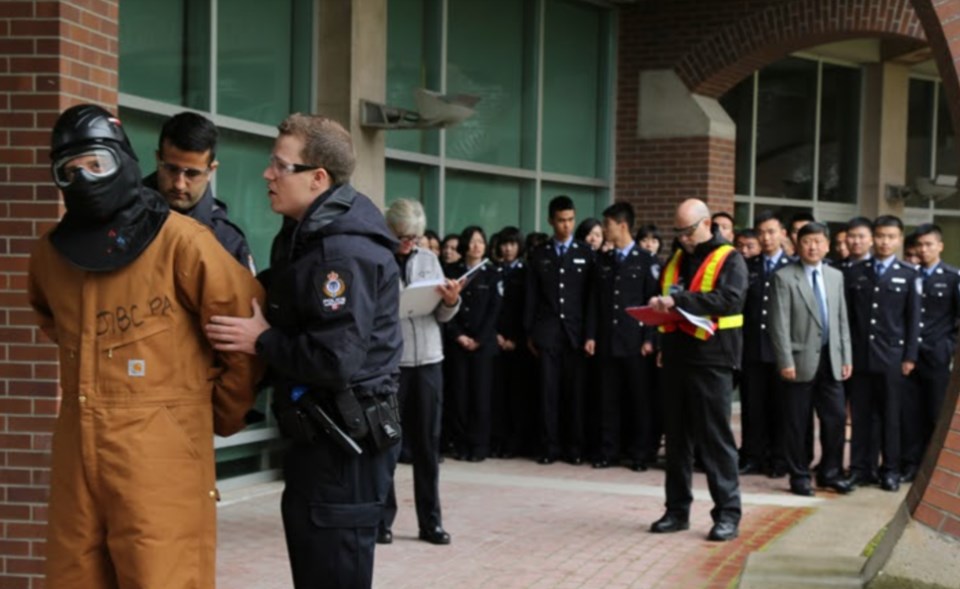The B.C. Ministry of Advanced Education and Skills Training had overseen the International Law Enforcement Studies Certificate program at the Justice Institute of BC (JIBC) since 2014.
Up to November 2019 JIBC accepted close to 2,000 Chinese law enforcement students, recruits and officials, plus dozens of Chinese state judges, to its purported education and training programs.
JIBC took $2.2 million in fees, giving it a boost to staffing and ultimately netting $810,000. It also took in $1.1 million for rental fees for a facility in Chilliwack it revamped for the program. JIBC took money from over two-dozen Chinese institutions, such as the People’s Public Security University of China and the National Police University, according to records provided to Glacier Media.
While there is mention in JIBC documents about offering similar training to Saudi Arabian law enforcement institutions, JIBC did not receive any money from them since 2014 – the dates requested by Glacier Media.
Despite JIBC having partnered with one of the world’s most authoritarian regime, whose criminal justice systems enable widespread human rights violations, the (ILES) program had operated with limited guiding principles and oversight for such considerations. The Â鶹´«Ã½Ó³»Police Department helped train the Chinese recruits, and a key VPD teacher was Const. Terry Yung, who has a close relationship with China’s consul general.
JIBC board members raised concerns in late 2018, but the following year was the most lucrative for JIBC, which took in just over $1.1 million from the program.
In January Glacier Media reported on the program, launched by the BC Liberal government, which sought to deepen economic and social ties to China between 2013 and 2017. In that time, the BC Liberals did not increase public funding to JIBC, which reported international contract revenue (including non-law-enforcement studies, such as for firefighters and paramedics) nearly quadrupled from $600,000 in 2014 to $2.3 million in 2018. In that same period, international students increased more than sixfold.
The ILES program, critics charged, was at best a questionable source of revenue that does nothing to achieve its stated goal of reforming the authoritarian police regime or, at worst, a Trojan horse full of national security threats, such as foreign influence activity, espionage and further offshore human rights violations.
“To think for a second that the Chinese aren’t capable of policing their own people is ridiculous when they have a 99.9% conviction rate,” stated intelligence analyst and transnational organized crime expert Scott McGregor.
Although the Ministry of Public Security is distinct from the Ministry of Sate Security (China’s spy agency), the two work closely with one another.
On Monday Canada and allies announced a major cybersecurity attack by MSS on Microsoft servers. “Canada is confident that [China’s] Ministry of State Security is responsible for the widespread compromising of the exchange servers,” stated the Canadian government.
Last March, the that is to consider human rights violations for its program offerings.
JIBC turns to Mexican security establishment
JIBC has since with the Security Sciences University of Nuevo Leon State (SSUNL) in Monterrey, Mexico, which was established in 2011 and specializes in security and law enforcement education and training.
While there are widespread concerns about human rights abuses, including extrajudicial killings and corruption in Mexican police forces, it appears SSUNL has support from the United States, as the Commission on Accreditation for Law Enforcement Agencies has accredited in May 2019.
“Through the MOU the two educational institutions have agreed to work together on initiatives such as: developing collaborative training and education in public safety, including the areas of security and law enforcement; collaborating on student and faculty exchange opportunities; discussing potential joint research partnerships; and exploring opportunities to jointly develop a JIBC presence in Mexico,” noted a February 18 JIBC announcement.
“We look forward to working with SSUNL on all aspects of public safety training and to learn from them different approaches in their advanced training and intelligence activities,” said Stuart Ruttan, Dean of the School of Criminal Justice & Security and Office of International Affairs. “This partnership will help benefit our students, staff and faculty through this shared knowledge as well as potential educational and training opportunities from international exchanges.”
In April 2020, UN High Commissioner for Human Rights Michelle Bachelet “noted the need to create a new civil police force capable of combatting organized crime and drug trafficking while respecting human rights,” .
B.C. residents have just learned from a public inquiry that and local gangs to launder money in the province’s economy while supplying the region with fentanyl-laced street drugs.




